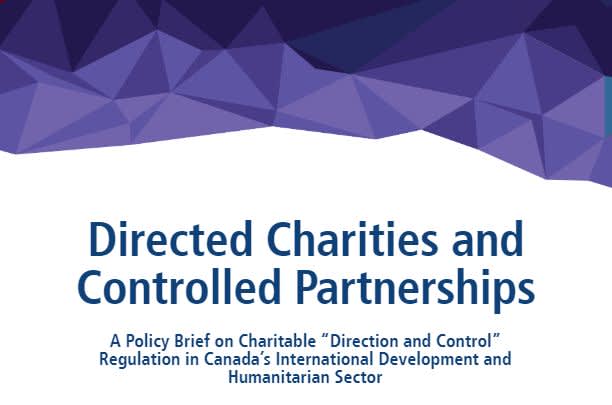Ottawa, ON (15 OCT 2019) – Cooperation Canada released a policy brief today showing that Canadian charities working internationally are governed by a set of provisions that restrict their ability to partner effectively in the delivery of their charitable mandate. Titled “Directed Charities and Controlled Partnerships,” the brief examines two regulatory and legislative elements: “direction and control” provisions and anti-terror legislation.
To download the full brief, visit Cooperation Canada’s web site here: Directed Charities and Controlled Partnerships
The brief includes recommendations that are informed by a literature review, a survey of Canadian charities, and comparative research including interviews with national charity coalitions from other high-income countries. Cooperation Canada also provides recommendations for how the Government of Canada can improve the regulatory and legislative framework for Canada’s charitable sector.
This analysis provides a unique perspective on this issue specific to the international cooperation sector. It includes input from the International Civil Liberties Monitoring Group (ICLMG) which collaborated on the section concerning anti-terrorism legislation.
This policy brief was produced with the financial support of the Muttart Foundation.
Canadian charities working internationally are required to exercise an extremely high level of operational control in their work. Unfortunately, this can undermine principles of effective development and good partnership. Fortunately, there are ways to improve, and we can draw on the experience of other countries and the expertise within Canada’s charitable sector.
Canadians expect humanitarian organizations to provide essential and live-saving support wherever it is needed, but they are being hindered in their work, despite their best efforts, by vague, broad and unnecessary anti-terrorism laws that do more to put people at risk than prevent violent crimes. Future governments should take decisive action to fix these troubling laws.
Canada’s “direction and control” provisions governing Canadian charities are unusual and unique among peer countries. These rules impose a high transaction cost to Canadian funding to projects around the globe and undermine partnership relations with others. We invite the Government of Canada to engage in dialogue and consultation with Canadian charities working internationally to ensure its policy on oversight of charitable resources reflects Canada’s commitments to partnership and localization in development cooperation and humanitarian assistance.
Background:
- In 2016, Cooperation Canada (then CCIC) made a submission to the Canadian Revenue Agency’s consultation on charities’ political activities. The report is titled “Modern Charities, Ancient Policies: Public policy and Canada’s development sector” and available here.
- In September 2018, Cooperation Canada made an oral testimony as part of the consultations in Advance of the 2019 Budget. One of the themes covered was the key role charities play in both the economic and societal success of Canada. The testimony is available here.
- In May 2019, Cooperation Canada made a submission with a list of recommendations to the Senate’s study on the charitable sector. The document is available here.
– 30 –
About Cooperation Canada: Since 1968, Cooperation Canada (formerly known as the Canadian Council for International Cooperation) has brought together more than 90 organizations working in the international development and humanitarian sector. Cooperation Canada is an advocate for these groups by convening sector leaders, influencing policy and building capacity. Together, Cooperation Canada works with partners inside and outside Canada to build a world that’s fair, safe, and sustainable for all. To learn more, visit cooperation.ca
Media Contact:
Kat Guerin Communications Manager
Phone: (613) 241-7007 ext. 343

